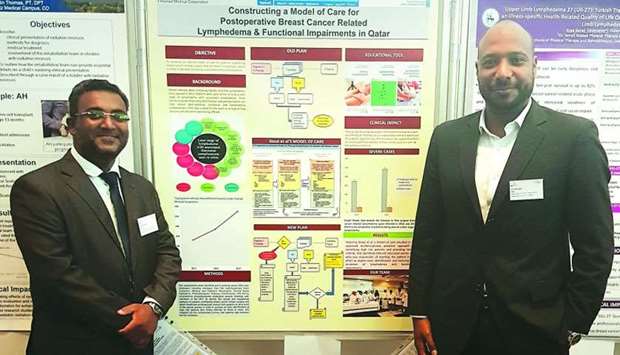Last month a delegation from Qatar participated in two international conferences in the Netherlands, receiving international praise for Hamad Medical Corporation (HMC)'s development of a dedicated lymphedema clinic.
The Physiotherapy and Lymphedema Department is the only provider of lymphedema treatment in Qatar. Last year, 341 patients received treatment for lymphedema at HMC; the majority of these patients were female breast cancer survivors. This year, 188 patients have received treatment for the condition and the number of cases is expected to increase to 400 by year’s end.
Organised by the Dutch Institute of Allied Health Care, the first International Conference on Physical Therapy in Oncology was held in Amsterdam on June 5 and brought together physical therapists, physicians, researchers, and other healthcare professionals from 32 countries to discuss the latest advancements and best practices in oncology-specific physical therapy.
Mohamed Shafi, head of the Physiotherapy and Lymphedema Department at HMC’s National Center for Cancer Care and Research (NCCCR) said Qatar was the only country from the region to present at the event, delivering a presentation on constructing a model of care for post-operative breast cancer-related lymphedema and functional impairments. He said HMC’s establishment of a dedicated lymphedema clinic was recognised during the gathering, and he noted that the clinic has improved the care of patients with the condition, especially post-operative breast cancer patients.
Lymphedema is a condition characterised by localised fluid retention and tissue swelling. It results from impaired flow of the lymphatic system, resulting in an abnormal accumulation of water and proteins in the tissue. Predominantly affecting the face, neck, arms, abdomen, legs and other parts of the body, the condition can be primary or secondary. Primary lymphedema is not directly attributable to another medical condition and can be present at birth or develop later in life. Secondary lymphedema normally occurs as a result of the removal of lymph nodes, trauma, abdominal surgeries, or cancer, specifically exposure to radiation therapy or the removal of lymph nodes and vessels as part of cancer treatments.
“Lymphedema can develop very slowly, with some of the early changes happening without noticeable symptoms. It can affect the limbs, toes, and feet and early symptoms of lymphedema may include a full or heavy sensation in the limbs and tightness of the skin or tissue,” said Shafi.
Presenting during the 8th International Lymphedema Framework Conference, held in Rotterdam from 6 to 8 June, Emad Basher Abdalla, a physiotherapist and certified lymphedema therapist at NCCCR, spoke about developing a dedicated lymphedema clinic and the impact on the population of Qatar. Prior to the establishment of the lymphedema clinic at NCCCR patients either had to leave the country to receive treatment or live with the physical and psychological burden of the condition.
Abdalla said international research and collaboration were an essential part of establishing the lymphedema service in Qatar. He said that in addition to caring for patients, HMC is also focused on raising awareness among medical professionals and the general public about lymphedema.

Mohamed Shafi and Emad Basher Abdalla at the conference venue in Amsterdam.
